Share
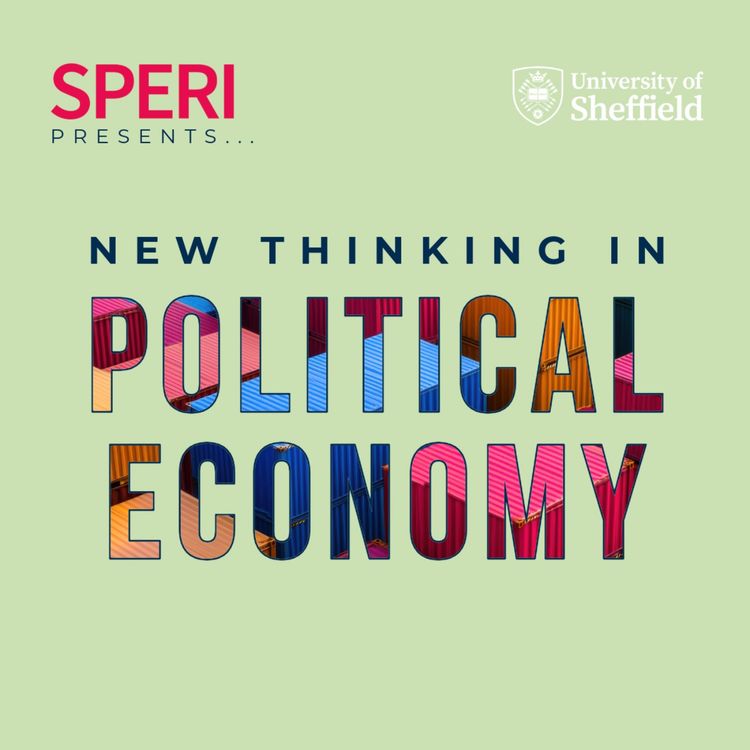
SPERI Presents...
New Thinking: Adam Smith & Corporations w/ Maha Rafi Atal
According to pioneering political economist Adam Smith, the liberalisation of trade was supposed to progressively grow social wealth for all nations and eliminate the need for social evils such as slave labour. Why, then, with production organised at a transnational scale and capital so mobile, do giant multinational companies continue to hoard profits while development stagnates for so many? And why does slavery and forced labour persist in global supply chains?
Dr Maha Rafi Atal is Adam Smith Senior Lecturer in Political Economy at University of Glasgow. She joins Dr Remi Edwards to discuss her recently co-authored article Adam Smith: His continuing relevance for contemporary management thought (2024). They consider what we can learn from Adam Smith to explain contemporary political economy challenges associated with global corporations including failures of corporate responsibility and regulation, extreme concentrations of power and wealth, and the difficulties of labour organising across borders.
Publications discussed also include Adam Smith's The Wealth of Nations (1776) and Theory of Moral Sentiments (1759).
Find out more about the Adam Smith 300 project at the University of Glasgow, including its' exhibition of his student's lecture notes discussed in the episode.
'New Thinking in Political Economy' is a monthly podcast showcasing cutting-edge political economy research that helps us to understand the world around us.
This episode is produced by the SPERI Presents… committee, including Remi Edwards, Chris Saltmarsh, Frank Maracchione, Emma Mahoney, Dillon Wamsley and Andrew Hindmoor. This episode was edited by Remi Edwards and Chris Saltmarsh. Music and audio by Andy_Gambino. Hosted on Acast. See https://acast.com/privacy for more information.
More episodes
View all episodes
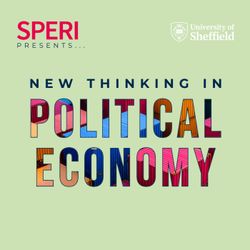
12. New Thinking: Financialisation of Football w/ James Jackson
45:36||Season 2, Ep. 12Who makes money out of football: broadcasters, clubs, players, or investment banks? Why are clubs selling their own assets to themselves? How do fans and players take collective action to resist the further financialisation of the sport? How important are local and foreign fans to the Premier League's boom? Is it inevitable that the Premier League will go bust?Dr James Jackson is a Hallsworth Research Fellow in Politics at University of Manchester. He joins Dr Remi Edwards and Josh White to discuss his article 'A league made in the economy's image: destabilised stability and the English Premier League's Minsky moment' (2025) co-authored with Dr James Silverwood and published in British Politics journal. They discuss the basis of football's financialisation in Thatcherism, the enduring importance of fans in making and disrupting the 'product' of Premier League football, and what might cause the Premier League's bubble to burst.Works cited in this episode include:David Webber, ‘Playing on the break’: Karl Polanyi and the double-movement ‘Against Modern Football’ (2015)Edwards & Jackson, The political economy of everyday life (2022)Cox & Philippou, Measuring the resilience of English Premier league clubs to economic recessions (2022)Kennedy & Kennedy, Towards a Marxist political economy of football supporters (2010)'New Thinking in Political Economy' is a monthly podcast showcasing cutting-edge political economy research that helps us to understand the world around us.This episode is produced by the SPERI Presents… committee, including Remi Edwards, Chris Saltmarsh, Josh White, Frank Maracchione, and Andrew Hindmoor. This episode was edited by Remi Edwards, Josh White and Chris Saltmarsh. Music and audio by Andy_Gambino. Hosted on Acast. See https://acast.com/privacy for more information.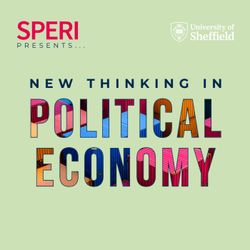
11. New Thinking: Capitalist Value Chains w/ Benjamin Selwyn
44:59||Season 2, Ep. 11How important is exploitation in the organisation of global supply chains? How do they drive geopolitical conflict and ecological destruction while depressing wages? How does the capitalist state drive and uphold capitalist accumulation? What does US-China rivalry mean for value chains?Benjamin Selwyn is Professor of International Relations and International Development at University of Sussex. He joins Dr Remi Edwards to discuss his new book Capitalist Value Chains: Labour Exploitation, Nature Destruction, Geopolitics (Oxford University Press, 2025), co-authored with Christin Bernhold. They consider the limitations of mainstream 'global value chains' literature; how critical approaches draw stronger connections between geopolitics, labour exploitation and environmental destruction; the role of the state in reproducing the domination of labour by capital; and visions for an alternative plant-based food system organised according to need, not profit.'New Thinking in Political Economy' is a monthly podcast showcasing cutting-edge political economy research that helps us to understand the world around us.This episode is produced by the SPERI Presents… committee, including Remi Edwards, Chris Saltmarsh, Frank Maracchione, Emma Mahoney, and Andrew Hindmoor. This episode was edited by Remi Edwards and Chris Saltmarsh. Music and audio by Andy_Gambino. Hosted on Acast. See https://acast.com/privacy for more information.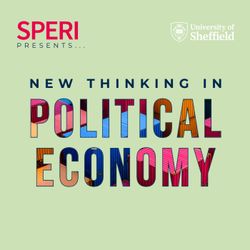
10. New Thinking: Is there a Chinese road to decarbonisation? w/ Chris Saltmarsh
44:20||Season 2, Ep. 10Does China’s unique party-state capitalist political economy model hold the key for global climate transition? Can the Chinese Communist Party (CCP) translate its success in expanding green energy technology to the destruction of the fossil fuel industry? What does China’s idea of ecological civilisation offer that Western notions of green capitalism do not? How should activists in the West respond to the rise of China amid the climate crisis?Chris Saltmarsh is a postgraduate researcher at University of Sheffield and the executive producer of SPERI Presents… He joins Dr Remi Edwards to discuss his paper ‘The Chinese Road to Decarbonisation: Chinese Party-State Capitalism in the Political Economy of Fossil Energy Phase-Out’ recently published in Review of International Political Economy. They discuss the relationship between green energy build-out and fossil energy phase-out; the basis of China’s development in socialist revolution; whether China’s unique political economy affords it greater potentiality to phase-out fossil fuels; and both the practical challenges and theoretical implications of achieving such an undertaking.Publications discussed also include Cheek’s Xi Jinping’s Counter-Reformation: The Reassertion of Ideological Governance in Historical Perspective, Ban and Hasselbalch’s Green economic planning for rapid decarbonisation, Gabor and Braun’s Green macrofinancial regimes, Huber’s Theorizing the subterranean mode of production, and Malm’s Fossil Capital.'New Thinking in Political Economy' is a monthly podcast showcasing cutting-edge political economy research that helps us to understand the world around us.This episode is produced by the SPERI Presents… committee, including Remi Edwards, Chris Saltmarsh, Frank Maracchione, Emma Mahoney, Dillon Wamsley and Andrew Hindmoor. This episode was edited by Remi Edwards and Chris Saltmarsh. Music and audio by Andy_Gambino. Hosted on Acast. See https://acast.com/privacy for more information.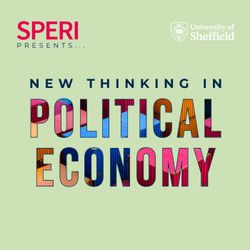
9. New Thinking: Why is labour governance failing racialised workers? w/ Natalie Langford
41:58||Season 2, Ep. 9What is labour governance and why is it failing? How effective is civil society activism at improving labour conditions in global value chains? What does the Indian tea industry tell us about the consequences of colonialism and globalisation for racialised workers? What role did the collapse of the USSR play in creating our contemporary situation?Dr Natalie Langford is Lecturer in Sustainability at University of Sheffield. She joins Dr Remi Edwards to discuss her paper 'The limits of labor governance in global value chains: exclusions, ‘edge’ populations and civil society activism in unstable labor regimes' recently published in Review of International Political Economy. They consider how workers in the Indian tea industry experience extreme precarity and starvation deaths; the role of local trade unions, NGOs, governments and corporations in improving labour conditions in global supply chains; and challenges arising from the racialisation of workers through colonialism and globalisation.Publications discussed also include Bair and Werner's Commodity Chains and the Uneven Development of Global Capitalism (2011) and Bhattacharyya's Rethinking Racial Capitalism (2017).'New Thinking in Political Economy' is a monthly podcast showcasing cutting-edge political economy research that helps us to understand the world around us.This episode is produced by the SPERI Presents… committee, including Remi Edwards, Chris Saltmarsh, Frank Maracchione, Emma Mahoney, Dillon Wamsley and Andrew Hindmoor. This episode was edited by Remi Edwards and Chris Saltmarsh. Music and audio by Andy_Gambino. Hosted on Acast. See https://acast.com/privacy for more information.
1. Live: Is organised violence central to capitalism? @ BISA 2025
58:19||Season 4, Ep. 1How are technologies used by militaries to enact organised violence produced? How are post-industrial regions of the UK becoming dependent on the supply chains of the global war industry? What narratives enable organised violence perpetrated by elites, and how are they resisted? What is the role of everyday tedium and mundanity in producing such violence?Dr Joanna Tidy is a Senior Lecturer in Politics at University of Sheffield. Dr Beryl Pong is a UKRI Future Leaders Fellow at the Centre for the Future of Intelligence, University of Cambridge. Dr Frank Maracchione is a Postdoctoral Research Associate at University of Kent. Dr Elena Simon is a doctoral alumnus of the University of Sheffield. Vicki Reif-Breitwieser is a postgraduate researcher at University of Sheffield and co-convenor of the SPERI Doctoral Researchers Network.They join Dr Remi Edwards to discuss the political economy of organised violence enacted by, between and within states. They consider the relationship between ruling elites' violence and capitalist economies; how violence is produced by particular ways of knowing; the boundary (or lack thereof) between the civil and the military; the everyday as an important site where violence is made and contested in the global political economy; and how novel forms of data collection can help us more effectively study organised violence.This SPERI Presents... episode is a live recording of the roundtable "Towards a Political Economy of organised violence: war, technologies, labour, and (re)production" at BISA 2025 conference. It took place in Belfast on Wednesday 18 June 2025.This episode is produced by the SPERI Presents… committee, including Remi Edwards, Chris Saltmarsh, Frank Maracchione, Emma Mahoney, Dillon Wamsley and Andrew Hindmoor. This episode was edited by Remi Edwards and Chris Saltmarsh. Music and audio by Andy_Gambino. Hosted on Acast. See https://acast.com/privacy for more information.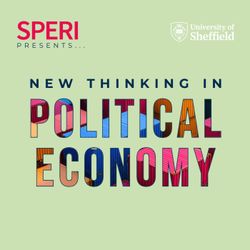
8. New Thinking: How does India's agrarian crisis harm women workers? w/ Shreya Sinha
41:57||Season 2, Ep. 8The crisis of India's agrarian sector has been widely reported amid spates of farmer suicides and mass protest as incomes decline and indebtedness rises in response to falling productivity. What are the underlying causes of this persist crisis in India's agriculture? Is it right that we understand these phenomenon as 'crisis'? Who are the winners and losers? In particular, how are women workers disproportionately affected by the current upheavals?Dr Shreya Sinha is Senior Lecturer in Business and Society at Queen Mary, University of London. She joins Dr Remi Edwards to discuss her paper 'Shifting agrarian labour regimes, ecology, and the crisis for Dalit women’s work in India' (2024) recently published in the Journal of Economic Geography. They consider what makes the conditions of Indian agriculture a 'crisis', social reproduction and the crisis' effects on women workers, the relationship between ecology and labour, and how political ecology and political economy can help make sense of the situation.'New Thinking in Political Economy' is a monthly podcast showcasing cutting-edge political economy research that helps us to understand the world around us.This episode is produced by the SPERI Presents… committee, including Remi Edwards, Chris Saltmarsh, Frank Maracchione, Emma Mahoney, Dillon Wamsley and Andrew Hindmoor. This episode was edited by Remi Edwards and Chris Saltmarsh. Music and audio by Andy_Gambino. Hosted on Acast. See https://acast.com/privacy for more information.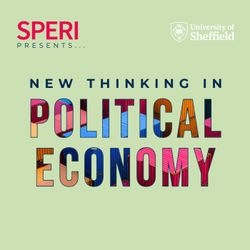
7. New Thinking: Technocapitalism w/ Sami Moisio and Ugo Rossi
42:21||Season 2, Ep. 7How have states evolved in tandem with the spread of techno-monopoly? Why do states and cities increasingly behave like startups? Is social polarisation a product of the startup economy or is it a necessary precondition? Sami Moisio is Professor of Spatial Planning and Policy in the Department of Geosciences and Geography at the University of Helsinki. Ugo Rossi is Professor of Economic and Political Geography at the Gran Sasso Science Institute University. Beth Perry is Professor of Urban Knowledge Governance at University of Sheffield and Director of the Urban Institute.They join Dr Remi Edwards to discuss Sami and Ugo's new book The Urban Field: Capital and Governmentality in the Age of Techno-Monopoly. They consider the relationship between the urban field and techno-capitalism, inequalities between the creative class and casual workers in the knowledge economy, and the relationship between the startup economy and cities. 'New Thinking in Political Economy' is a monthly podcast showcasing cutting-edge political economy research that helps us to understand the world around us.This episode is produced by the SPERI Presents… committee, including Remi Edwards, Chris Saltmarsh, Frank Maracchione, Emma Mahoney, Dillon Wamsley and Andrew Hindmoor. This episode was edited by Remi Edwards and Chris Saltmarsh. Music and audio by Andy_Gambino. Hosted on Acast. See https://acast.com/privacy for more information.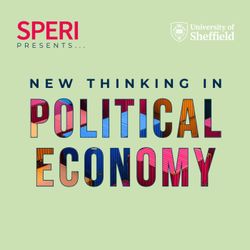
6. New Thinking: Big Pharma w/ Owain Williams
37:48||Season 2, Ep. 6A tiny number of huge companies dominate the pharmaceutical industry, making extraordinary profits in the process. All the while, the poorest people around the world struggle to access medicines they need to survive. What does the COVID-19 pandemic tell us about Big Pharma? What's the problem with a cartelized global market? What role does Bill Gates play in solving (or reproducing) the big challenges of global health? Is there a political economy explanation for rising anti-vaccine sentiment? Should we expect Trump's second Presidency to challenge the dominance of Big Pharma?Dr Owain Williams is a Senior Research Fellow at the Commercial and Economic Determinants of Health Research Translation Centre at Deakin University in Melbourne, Australia and a Visiting Associate Professor in Global Political Economy and Health at University of Leeds. Professor Simon Rushton is Professor of International Politics at University of Sheffield. They join Dr Remi Edwards to discuss Owain's recent co-authored paper COVID and structural cartelisation: market-state-society ties and the political economy of Pharma (2024). They consider the relationship between states and big pharmaceutical firms; the role of philanthropic-capitalist organisations like the Gates Foundation in global health governance; how effective (or not) markets are in delivering welfare goods like vaccinations; and the rise of vaccine hesitancy across the political spectrum.'New Thinking in Political Economy' is a monthly podcast showcasing cutting-edge political economy research that helps us to understand the world around us.This episode is produced by the SPERI Presents… committee, including Remi Edwards, Chris Saltmarsh, Frank Maracchione, Emma Mahoney, Dillon Wamsley and Andrew Hindmoor. This episode was edited by Remi Edwards and Chris Saltmarsh. Music and audio by Andy_Gambino. Hosted on Acast. See https://acast.com/privacy for more information.
12. Crisis Point: A Theory Of Crisis w/ Dillon Wamsley & Chris Saltmarsh
44:20||Season 3, Ep. 12How do we make sense of the multitude of so-called crises that dominate our current conjuncture? Is polycrisis a useful concept for getting to grips with the present condition of political economy? Are its proponents right to embrace uncertainty at the expense of theoretical explanation? Or can we hope to make sense of what's going on and chart a path forward?Chris Saltmarsh is a postgraduate researcher at University of Sheffield. Dillon Wamsley is a postdoctoral researcher the Sheffield Political Economy Research Institute (SPERI). They are producers and co-hosts of Crisis Point, a SPERI Presents... limited series introducing the political economy of capitalist crises, providing historical and theoretical rigour to discourses around crisis in the present. In this final episode, they review the series by proposing a definition and theory of crisis. They draw distinction between crises of accumulation and legitimation, reflect on the nature of political economy in the aftermath of the 2008 crash, consider what the idiosyncrasies of climate change mean for the general theory, and finish by asking 'what is to be done'?Works referenced in this episode:Gamble, The Spectre at the Feast (Bloomsbury, 2009)Adam Tooze on polycrisis (YouTube lecture)Further Reading:1) Tooze, 'Chartbook #130 Defining polycrisis - from crisis pictures to the crisis matrix' (2022)2) Holgersen, Against the Crisis: Economy and Ecology in a Burning World (Verso, 2024)This episode is produced by the SPERI Presents… committee, including Remi Edwards, Chris Saltmarsh, Frank Maracchione, Emma Mahoney, Dillon Wamsley and Andrew Hindmoor. This episode was edited by Chris Saltmarsh and Dillon Wamsley. Music and audio by Andy_Gambino. Hosted on Acast. See https://acast.com/privacy for more information.